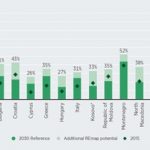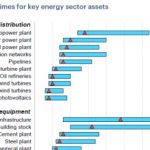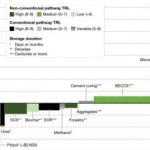Among others, lack of preparedness for communities to tap the full bioenergy market potential[1], lack of bioenergy stakeholders’ awareness of the potential of communities and missing/ unsupportive (local, regional and national) framework and policy conditions. For a people-powered energy system, the Horizon 2020-funded project BECoop (2020-2023) aims at putting communities in charge of their local renewable (bio)energy generation. … [Read more...]
Bioenergy is the undervalued pillar of the clean energy transition
Bioenergy is already the world’s largest source of renewable energy, responsible for 70% of the supply (and around 10% of total primary energy). Burning organic matter goes back to the invention of fire and is still commonplace around the globe. Yet it gets hardly any of the attention and policy support that’s given to other clean energy technologies like solar, wind and now hydrogen. Bioenergy can and should play an even greater role, explain … [Read more...]
Accelerating renewables in Central and South East Europe
What is the potential for renewables in Central and South East Europe? Luis Janeiro, Seán Collins and Ricardo Gorini at IRENA summarise their clean energy pathway for CESEC (the Central and South Eastern Europe energy connectivity initiative). The region has very good resource conditions to scale up renewables. Spectacular cost reductions in wind and solar over the last few years can provide a cheaper source of new electricity than the least-cost … [Read more...]
Hydrogen, CCS, and more: without new clean energy technologies we cannot hit our 2050 emissions targets
The flagship 400-page report, Energy Technology Perspectives 2020, is another salvo from the IEA to concentrate the minds of the world on new technologies and their roll out. That’s because transforming electrification and the power sector alone, where most of the progress is happening, will only get us one-third of the way to net-zero emissions by 2050. The IEA has analysed over 800 new technology options. The most important categories – … [Read more...]
2019-2024: competitive auctions will launch over 2/3rds of utility-scale renewables, says IEA
Government support for new utility-scale capacity is being replaced with competitive auctions, the surest sign that the commercial appetite for renewables - particularly solar PV and onshore wind - is growing strong. This article by the IEA pulls out the essential numbers from their annual Renewables 2019 report (their 5-year market analysis and forecast for renewable energy and technologies in the electricity, heat and transport sectors). The … [Read more...]
10 Carbon Capture methods compared: costs, scalability, permanence, cleanness
We need to understand carbon capture, storage and utilisation (CCUS) better. To do so, this article looks at 10 methods and estimates how much CO2 each will take out of the atmosphere by 2050, and the cost per tonne. In their list the authors, Ella Adlen and Cameron Hepburn at the University of Oxford, cover the industrial (e.g. CO2-EOR, synfuels) to the biological (e.g. forestry, soil carbon sequestration). They say there are six that can be … [Read more...]
Cheaper than coal: IRENA’s comprehensive report on cost declines, all renewables categories
The International Renewable Energy Agency’s (IRENA) latest report Renewable Power Generation Costs in 2018 details the global weighted-average levelised cost of electricity (LCOE) for all commercially available renewable technologies. It states that renewables are already the lowest-cost source of new power generation in many parts of the world today. By as soon as 2020, onshore wind and solar PV will join hydropower in consistently offering a … [Read more...]
Carbon Capture: Can CO2-EOR really provide carbon-negative oil?
Enhanced Oil Recovery (EOR) injects CO2 into oil reservoirs, increasing the pressure and forcing the oil out. 20% of global oil production uses EOR. But if that CO2 doesn’t stay underground it hasn’t been captured. If it was itself extracted from natural underground CO2, there is no benefit – or worse. Ideally, it should come from already captured CO2. But most oil wells are nowhere near a CCUS (carbon capture, usage and storage) facility: in the … [Read more...]
Interview bio-energy expert André Faaij: “So much nonsense has been told – high time for the real story”
“An enormous amount of nonsense” has been told about bio-energy, says André Faaij, scientific director of Energy Academy Europe and professor Energy Systems Analysis at the University of Groningen in the Netherlands. According to Faaij, it is high time for the real – scientifically validated – story. “The bio-based economy is indispensable for our climate policy and can mean huge progress for agriculture and nature in developing countries”. … [Read more...]










